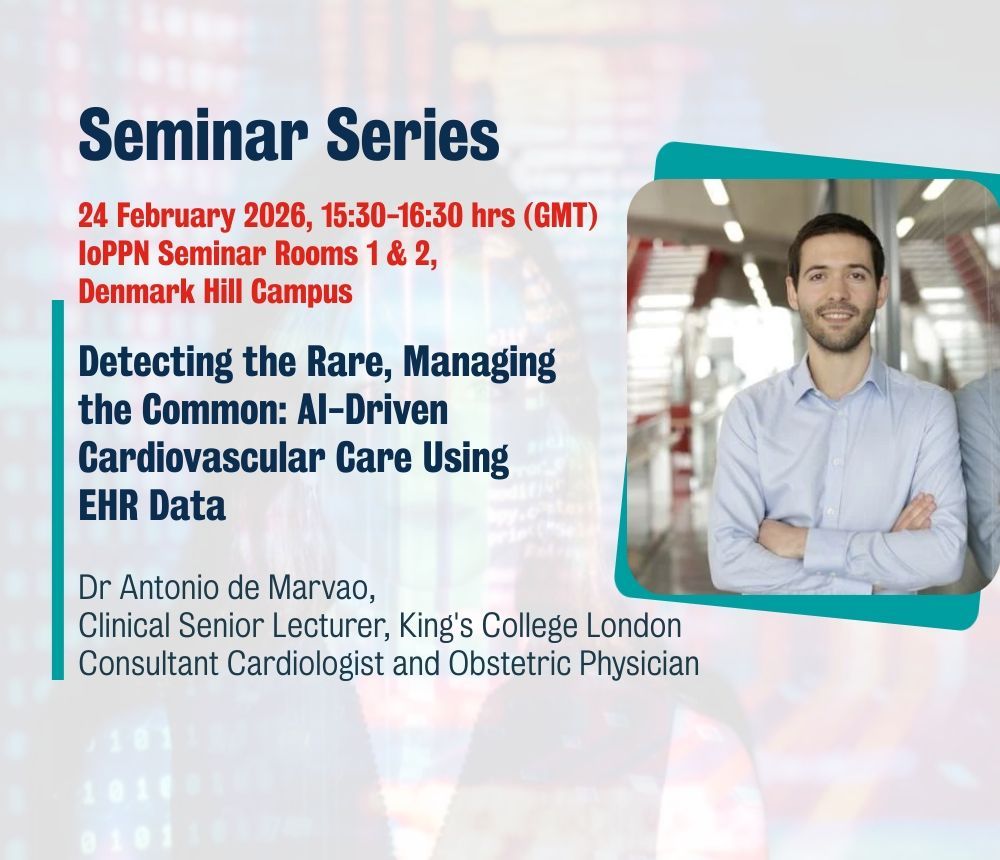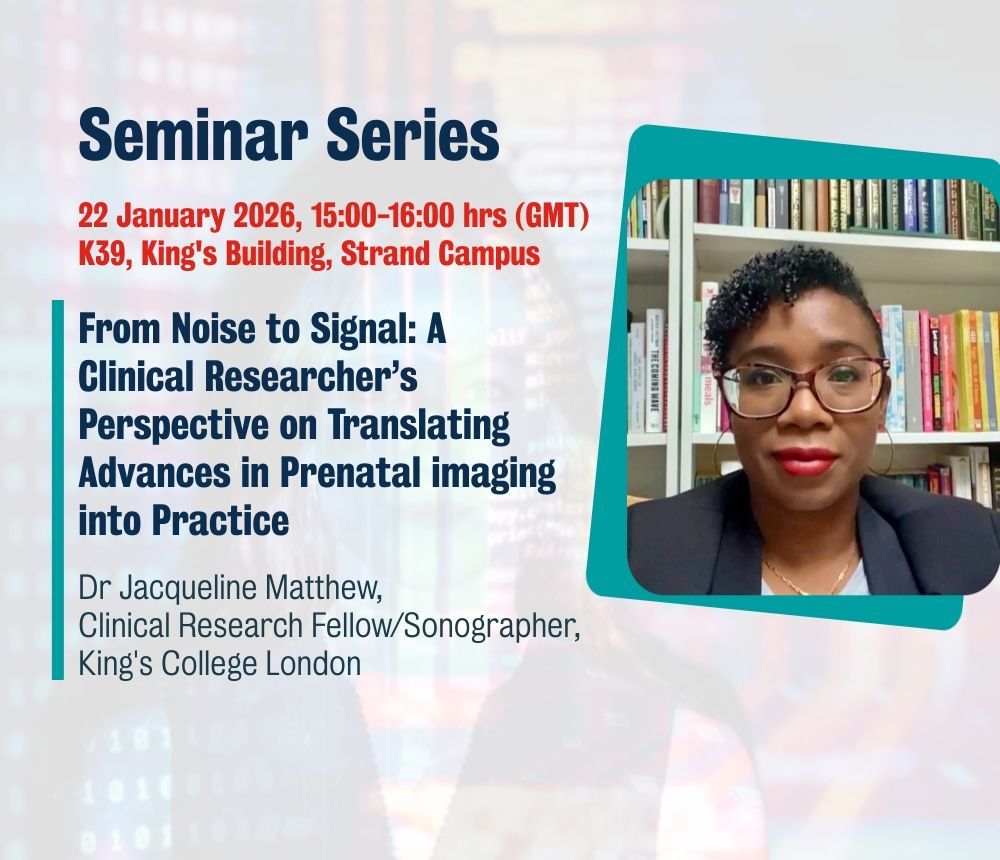Congratulations to our student, Dina Farran
May 22, 2024
View Dina's Abstract
We are delighted to share that one of our EPSRC DRIVE-Health CDT students and PhD candidate at the IoPPN, Dina Farran, has been awarded 1st prize presentation at the recent Royal College of Psychiatrists Faculty of Liaison Psychiatry annual conference earlier this month. Dina is working under the supervision of Professor Fiona Gaughran and Professor Mark Ashworth and is about to submit her thesis at the end of this month.
In the presentation, Dina summarised her PhD project consisting of a literature review, 2 observational studies, an intervention and 2 qualitative studies. Dina provides further detail below.
Background
Atrial fibrillation (AF), the most prevalent cardiac arrhythmia, is associated with an increased risk of stroke contributing to heart failure and death. In this project, we aim to improve patient safety by screening for stroke risk among people with AF and co-morbid mental illness.
Methods
(a) Conducted a systematic review and meta-analysis on prevalence, management, and outcomes of AF in people with Serious Mental Illness (SMI) versus the general population.
(b) Evaluated oral anticoagulation (OAC) prescription trends in people with AF and co-morbid SMI in King’s College Hospital.
(c) Identified the recorded rates of OAC prescription among people with AF and various mental illnesses and evaluated the association between mental illness severity and OAC prescription in eligible patients in South London and Maudsley (SLaM) NHS Foundation Trust.
(d) Implemented an electronic clinical decision support system (eCDSS) consisting of a visual prompt on patient electronic Personal Health Record to screen for AF-related stroke risk in three Mental Health of Older Adults wards at SLaM.
(e) Assessed the feasibility and acceptability of the eCDSS by qualitatively investigating clinicians’ perspective of the potential usefulness of the eCDSS (pre-intervention) and their experiences and their views regarding its impact on clinicians and patients (post-intervention).
Results
(a) People with SMI had low reported rates of AF. AF patients with SMI were less likely to receive OAC than the general population. When receiving warfarin, people with SMI, particularly bipolar disorder, experienced poor anticoagulation control compared to the general population. Meta-analysis showed that SMI was not significantly associated with an increased risk of stroke or major bleeding when adjusting for underlying risk factors.
(b) Among AF patients having a high stroke risk, those with co-morbid SMI were less likely than non-SMI patients to be prescribed any OAC, particularly warfarin (but not DOACs). However, there was no evidence of a significant difference between the two groups since 2019.
(c) Adjusting for age, sex, stroke and bleeding risk scores, patients with AF and co-morbid SMI were less likely to be prescribed any OAC compared to those with dementia, substance use disorders or common mental disorders. Among AF patients with co-morbid SMI, warfarin was less likely to be prescribed to those having alcohol or substance dependency, serious self-injury, hallucinations or delusions and activities of daily living impairment.
(d) Clinicians were asked to confirm the presence of AF, clinically assess stroke and bleeding risks, record risk scores in clinical notes and refer patients at high risk of stroke to OAC clinics.
(e) Clinicians reported that the eCDSS saved time, prompted them towards guidelines, boosted their confidence, and identified patients at risk. Perceived barriers to using the tool included low admission rate of AF cases, low or insufficient visibility of the alert/awareness of the tool, and impact of the eCDSS on workload.
Conclusions
This study presents a unique opportunity to quantify AF patients with mental illness who are at high risk of severe outcomes, using electronic health records. This has the potential to improve health outcomes and therefore patients' quality of life.
Share

We are pleased to welcome Dr Antonio de Marvao - Clinical Senior Lecturer at King's College London, and Consultant Cardiologist and Obstetric Physician at GSTT and KCH - who will deliver his talk “Detecting the Rare, Managing the Common: AI-Driven Cardiovascular Care Using EHR Data" as part of our Seminar Series. Abstract: Cardiovascular disease encompasses rare inherited conditions and highly prevalent disorders such as hypertension and cardiometabolic disease. Despite differing epidemiology, both require accurate, dynamic and scalable risk stratification. Electronic health records provide longitudinal, multimodal data at population scale. However, their heterogeneity and fragmentation demand advanced artificial intelligence methods to generate clinically actionable insight. Approximately 70 to 80 percent of NHS data exists in unstructured free text, rendering much of the clinically relevant signal inaccessible to conventional analytics without natural language processing or large language models. To address this challenge, we have been developing an AI-enabled framework for real-world cardiovascular risk prediction using integrated EHR data. The approach brings together structured clinical variables, imaging outputs and free-text documentation within secure hospital environments. Natural language processing and large language models are used to transform narrative records into computable features, while chain-of-thought reasoning architectures extract guideline-defined risk parameters directly from routine documentation. This enables automated calculation of established risk scores and dynamic longitudinal reassessment within an agentic workflow. Local, open-source models are evaluated across parameter scales to ensure an appropriate balance between accuracy, safety and computational efficiency for clinical deployment. In inherited cardiac conditions, this approach enables automated extraction of echocardiographic and clinical features required for sudden cardiac death risk prediction, reducing manual burden and supporting real-time monitoring. The same principles extend to hypertensive disorders of pregnancy, facilitating earlier detection, structured surveillance and stratification of long-term cardiovascular risk. Integration of high-resolution EHR-derived phenotypes with genomic and multi-omics datasets further supports progression from risk prediction to biological insight and therapeutic target discovery. Applied rigorously, AI methodologies operating on routine healthcare data provide a scalable foundation for precision cardiovascular care across the life course. Seminar Series Event : “Detecting the Rare, Managing the Common: AI-Driven Cardiovascular Care Using EHR Data" Date and Time: Tuesday 24 February 2026, 15:30 – 16.30 hrs (GMT) Location: IoPPN Seminar 1 & 2, Denmark Hill Campus Attendance: Mandatory for all DRIVE-Health students; a calendar invitation has already been sent. Registration: Alumni and wider King's College London research community all welcome - please email drive-health-cdt@kcl.ac.uk to let us know if you would like to attend. Biography Antonio de Marvao is a Clinical Senior Lecturer at KCL, and a Consultant Cardiologist and Obstetric Physician at GSTT and KCH, specialising in inherited cardiac conditions, maternal cardiology, and hypertensive disorders of pregnancy. His research sits at the intersection of electronic health records (EHR) derived phenotyping, genomics/multi-omics, and cardiovascular imaging, using machine learning to improve risk prediction modelling and personalise care, across the reproductive continuum - from pregnancy to postpartum - and long-term cardiovascular prevention. He leads work within the NHS England Genomic AI Network, applying natural language processing, large language models and multimodal EHR integration to identify patients with inherited cardiovascular disease, streamline specialist review, and improve access to genetic testing and family screening. In parallel, his group also uses AI and EHR data to better define and detect hypertensive disorders of pregnancy at scale, quantify disparities, and enable earlier, more targeted intervention.

We were pleased to welcome Dr Jacqueline Matthew - Clinical Research Fellow/Sonographer at King's College London - who delivered her talk “From Noise to Signal: A Clinical Researcher's Perspective on Translating Advances in Prenatal imaging into Practice" as part of our Seminar Series. Abstract: Over the past decade, machine learning approaches in prenatal imaging has advanced from exploratory academic prototypes to clinically usable, real-time tools, but the path between those two endpoints is rarely straightforward. In this talk, Jacqueline offered a clinical researcher’s perspective on translating biomedical engineering innovations into real-world impact, tracing the journey from the iFIND project’s early breakthroughs in automated fetal imaging to the creation of Fraiya, an AI-driven ultrasound platform now entering clinical deployment. She unpacked the technical, clinical, and regulatory hurdles that shape this trajectory: data acquisition at scale, annotation complexity, model robustness, pipeline optimisation for real-time use, clinical safety engineering, regulatory strategy, and integration with NHS digital ecosystems. Beyond the technical achievements, the session reflected honestly on the innovation “gaps” that researchers and engineers encounter when stepping into entrepreneurship. From productising research outputs, building 'with' clinicians and service users not just 'for' them, securing buy-in, navigating procurement, and proving value in operationally stretched healthcare services. The aim was to provide a pragmatic and motivating roadmap for researchers and innovators seeking to turn biomedical AI research into deployable, sustainable solutions in healthcare. Seminar Series Event : “From Noise to Signal: A Clinical Researcher's Perspective on Translating Advances in Prenatal imaging into Practice. Date and Time: Thursday 22 January 2026, 15:00 – 16.00 hrs (GMT) Location: K39, King's Building, Strand Campus Attendance: Mandatory for all DRIVE-Health students, therefore please accept the calendar invitation. Registration: Alumni and wider King's College London research community all welcome - please email drive-health-cdt@kcl.ac.uk to let us know if you would like to attend. Biography Jacqueline is a clinical academic, sonographer, and MedTech entrepreneur with over 20 years of experience in advancing pregnancy care through compassionate, technology-driven solutions. Specialising in ultrasound and fetal MRI, Jacqueline’s work focuses on leveraging cutting-edge imaging technologies to improve screening, diagnosis, and care for pregnant women. With a PhD in advanced 3D ultrasound and fetal MRI, Jacqueline uses machine learning to refine diagnostic pathways, pushing the boundaries of what’s possible in prenatal care. As Clinical Lead and Chief Medical Officer at an early-stage health tech startup, she has been at the forefront of developing a real-time AI-powered pregnancy ultrasound platform, with ambitions to transform how scans are performed, enhancing diagnostic accuracy, and empowering healthcare professionals to deliver more informed and compassionate care. Jacqueline’s work has earned her widespread recognition, including being named one of the inaugural winners of the NHS England CAHPO Gold Award for Excellence, which celebrates health professionals who exemplify exceptional contributions to healthcare and the NHS values.




